What Animal Eats Rocks To Help Digestion
Reptiles and mammals are like shooting fish in a barrel to tell apart, only what is the difference betwixt a reptile and an amphibian? Is a crocodile a reptile, or is it an amphibian? Nosotros know it is not a fish (although information technology spends time in the water) and definitely non a bird (no feathers, can't fly). So, what makes a reptile a reptile, and what is a crocodile?
What Is A Reptile?
There are a few characteristics that all (or about) reptiles have in common. All reptiles are vertebrates, meaning they accept a backbone. Reptiles are also cold-blooded; they regulate their temperature based on their surrounding environment. Amphibians are vertebrates and are cold-blooded too. So, what makes them different? That is about all the two have in common. Reptiles breathe with lungs, amphibians with gills and lungs. Reptiles accept scales, and amphibians exercise not. Permit's accept a look at some of the characteristics of reptiles and run the crocodile through the reptile test!
Are Crocodiles Vertebrates?
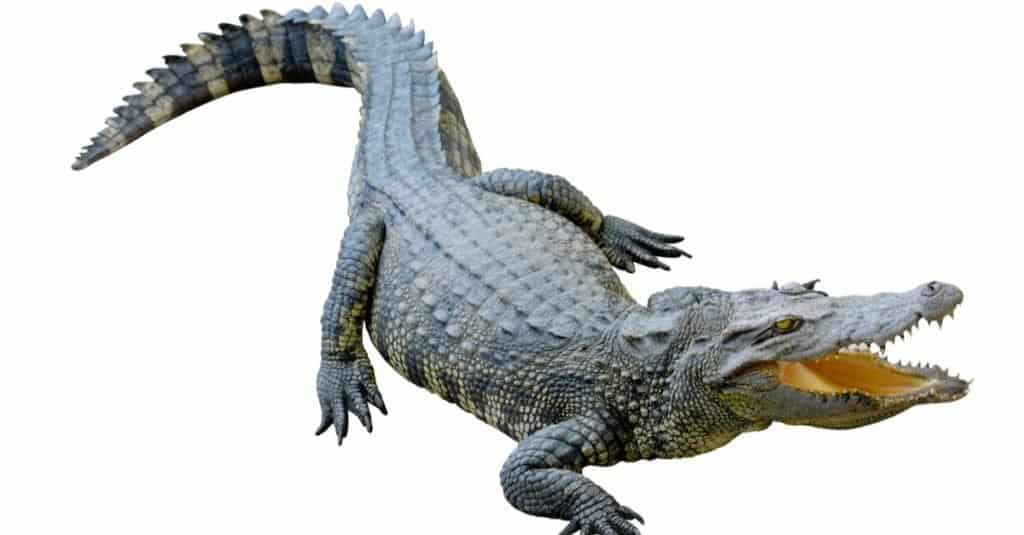
ShutterOK/Shutterstock.com
Crocodiles are vertebrates and have a long backbone that includes their tail. The largest crocodiles can abound to be 16-18 feet long, some even reaching 20 feet. Their tails, which are function of their backbone, are very muscular and are used to propel them through the water. They tin fifty-fifty apply their tail to jump out of the water. If an unsuspecting zebra comes to a waterhole for a drink, a crocodile can use its tail to launch at it and elevate it into the water, rolling it over ("decease roll") until it dies.
Are Crocodiles Common cold-Blooded?
Common cold-blooded animals cannot make their rut. Their temperature is the same as the temperature effectually them. If it is 90° on a sunny afternoon in the swamp, the crocodile'due south temperature would be 90°. Cold-blooded animals have to movement to different places in their habitat to arrange their temperature. If the water a crocodile is swimming in starts to get too cold, it can leave the water and lay on the riverbank in the sun. That is why you may see a group of crocodiles basking in the sun together. If yous see one with its mouth open, it is not a lazy hunter waiting like a Venus flytrap. Information technology is simply using this technique to absurd off just a trivial, similar tweaking the thermometer. Crocodiles prefer a temperature between 86°-91°.
Do Crocodiles Exhale With Lungs?
Yeah, crocodiles take lungs. Recollect almost a smashing white shark and its visible gills on the side. Crocodiles exercise non have gills. They breathe oxygen in the same style humans do. Crocodiles accept a 4-chambered center that pumps oxygenated claret throughout its body. One difference about crocodiles is that they have an adaptation to stay underwater for an hour or more than! Their centre rate can wearisome to 2-three beats a minute and conserve free energy, non needing equally much oxygen.
Practise Crocodiles Take Scales?
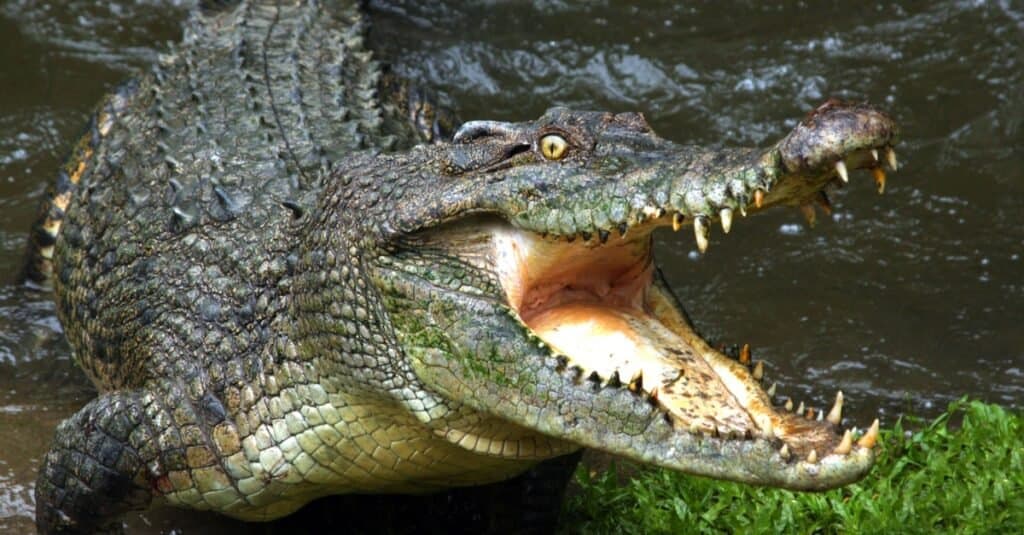
Yes, crocodiles have tough scales that protect them from predators and other crocodiles. The scales overlap and are made of keratin, like our hair and fingernails.
Do Crocodiles Shed Their Peel?
Crocodiles shed their pare, only non all at in one case. If you lot call back about a snake shedding its skin, you can notice a about intact snakeskin that looks just similar a ophidian just slithered out of it. Crocodiles are different and shed individual scales or a few scales at a time.
Do Crocodiles Take Four Legs?
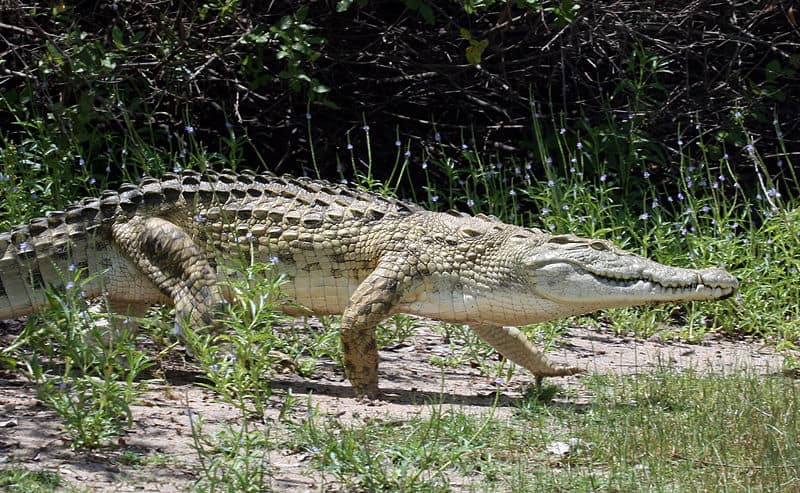
Vicky Baldwin / Creative Commons
Yes, crocodiles take four legs and powerful ones also. Crocodiles are skillful swimmers and faster on country than you would retrieve. They spend nearly of their lives in the water or basking in the sun on the shore, but they tin run 15-22mph in curt bursts if they need to. An average galloping speed of 7-10mph is more common. Their strong legs aid propel them in the water likewise.
Do Crocodiles Lay Eggs?
Yes, crocodiles lay eggs. Dwarf crocodiles lay 10-20 eggs. American crocodiles lay 30-sixty eggs, and saltwater crocodiles lay 40-threescore eggs. Crocodile eggs take a leathery crush. Sometimes, they will lay them all in i nest or a few nests in the same location. Mother crocodiles will lay their eggs in holes and cover them or create a mound around the nest to keep the eggs warm. She sticks around to keep an center on the nest and then digs the eggs out when it is time to hatch. Crocodile mothers comport their babies in their mouths to the nearest water source. Conservationists in Florida are tracking the number of American crocodiles and are pleased that the number increases each year.
Information technology's A Male child! It's All Boys!
Researchers discovered that the temperature of the eggs in the nest determines the sex of the crocodiles. If the temperature is warm, around 34° C (93° F), all the eggs will hatch males. If the temperature is a little cooler, effectually xxx° C (86° F), all the eggs will hatch females.
Are Crocodile Skulls The Same As Other Reptiles?
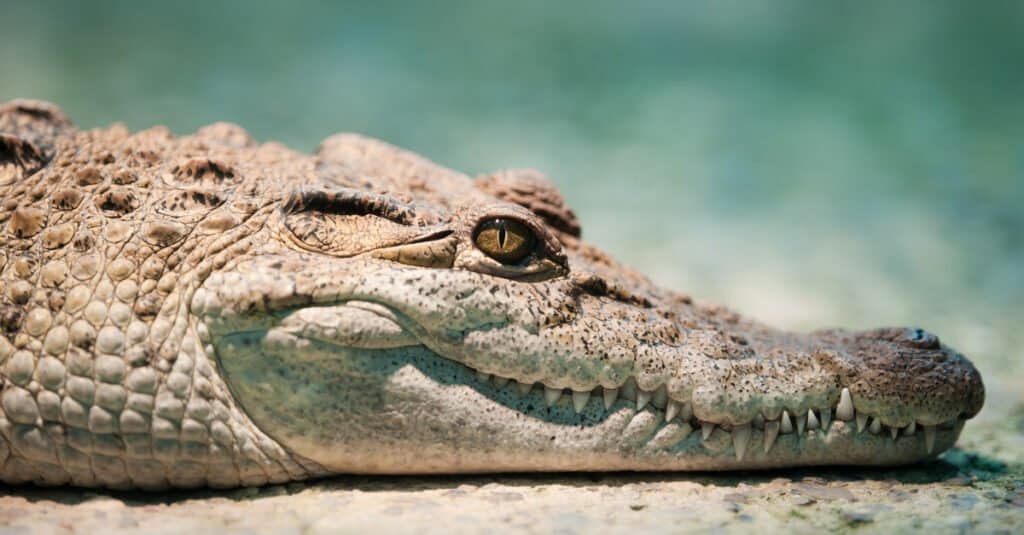
Peter Wey/Shutterstock.com
The skulls of crocodiles are different from snakes because crocodiles accept a unmarried row of teeth on the top jaw and lower jaw. Snakes have teeth on their palatal bone (a os on the roof of the mouth) and the upper and lower jaw. Recollect nigh a rattlesnake'south fangs, for example. Non-venomous snakes do non have fangs, simply most have teeth. Crocodile skulls have ii openings on either side of their head. The crocodile has a longer, skinnier snout on the skull compared to the alligator. Now I know why they say, "Grin, crocodile!" Crocodiles have lxxx teeth! They can regrow them when they fall out.
Practise Crocodiles Eat Meat?
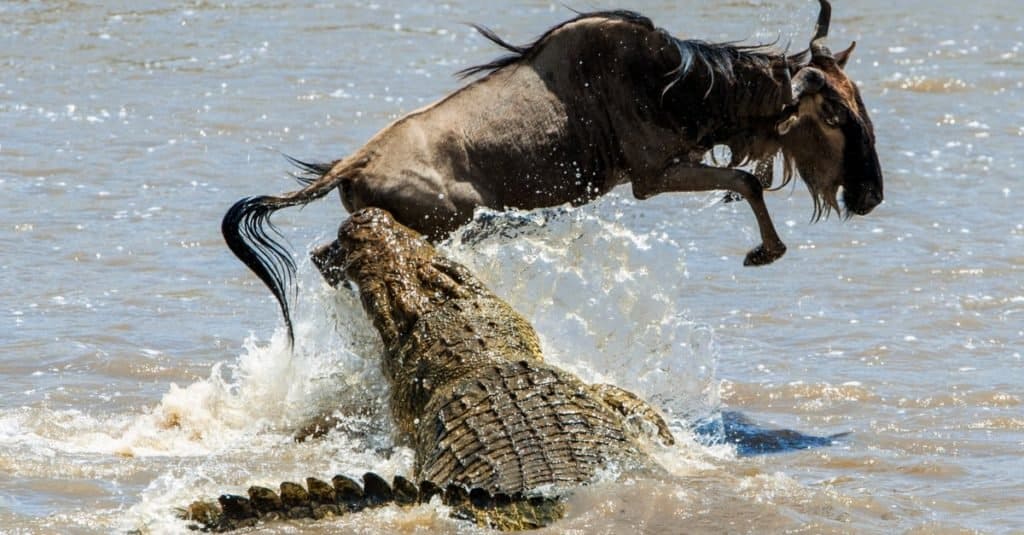
Sergey Uryadnikov/Shutterstock.com
Yes, crocodiles consume meat. They are carnivores and feast on many animals that come near the water's edge. Crocodiles eat fish, birds, crustaceans, small mammals, and in some countries, zebra and wildebeest.
Do Crocodiles Swallow Rocks?
Yes, crocodiles swallow rocks. They consume rocks to help with digestion. There is really a proper noun for a rock that has been in the digestive system of an beast. That rock is called a gastrolith. Not all reptiles eat rocks, but rocks play an important office in digestion for crocodiles since they cannot chew with their teeth. Other animals that eat rocks are chickens, ostriches, penguins, seals, and toothed whales. Snakes practise non eat rocks considering they accept heavy-duty acids and enzymes in their stomachs that break downwardly their food.
Are Crocodiles Reptiles?
Aye, crocodiles are reptiles. They accept some odd habits, but they are reptiles.
Source: https://a-z-animals.com/blog/are-crocodiles-reptiles/
Posted by: chasegazinsibelf.blogspot.com

0 Response to "What Animal Eats Rocks To Help Digestion"
Post a Comment